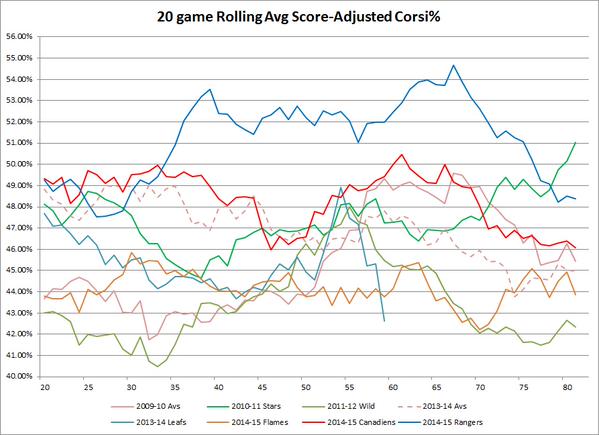
As the season has progressed, two things became very apparent for this year’s New York Rangers: They are not a great possession club, but they are still a very good hockey team. A lot of stats folks are already comparing them to last year’s Colorado Avalanche, who rode an absurdly high SV% from Semyon Varlamov to the playoffs, only to be ousted in the first round. There have been other comparisons to teams that missed the playoffs all together (last year’s Toronto Maple Leafs, the Minnesota Wild of w few years ago, etc).
The facts are pretty simple: The Rangers, when looking at their full season numbers, are not a great possession team. It’s something that’s been beaten to death, and a lot of folks have the Rangers bowing out in the first round. The combination of minimal possession and a high “luck” factor (SPSV%/PDO) have made the Rangers a target for early elimination, the same way the opposite scenario made them a dark horse to make a Cup run last year.
But that’s on the surface. The common “anti-stats” argument is that stats can be bent to prove any argument. While that is true, you don’t see those that apply stats properly doing this. The lazy narrative for the Rangers is taking the full season numbers and marking them as “ripe for the picking.” More analysis needs to be performed.
For starters, let’s remember that the Rangers have only played half the season with all three of Dan Boyle, Ryan McDonagh, and Kevin Klein in the lineup. Boyle played 14 minutes before breaking his hand, and then McDonagh missed most of November with a separated shoulder. Klein broke his arm in March. None of this includes the recent addition of Keith Yandle.
The Rangers have played just 43 games with Klein, McDonagh and Boyle in the lineup. and played a 52.45% possession game with them all dressed. When missing one, that number dropped to 48.77%. When missing two, down to 45.18%. Injuries affect possession numbers. (s/t to Rangersmurf). The Rangers haven’t dressed a fully healthy lineup since February (Henrik Lundqvist isn’t included in this analysis).
The counter argument is that Klein isn’t a great possession player, which is true. But this year has been a bit of an aberration for Klein, who is truly having a phenomenal season. He’s around 50% possession, so he’s far from the possession concern he has been previously.
This Rangers team is far from the SPSV%/PDO fueled teams mentioned above, even looking at them without any injury factors shows this (s/t to Rangersmurf again):
That’s the Rangers at the top, so this Rangers team is far from the possession disaster they are being compared to.
Moving on to that “luck” factor of SPSV%/PDO, many are pointing to an unnaturally high SV% and SH% as a reason why the Rangers will falter. First regarding that SV%: Henrik Lundqvist. Moving on.
I’ve tackled rush attempts and SH% already this month, and why this club may be different from the other SPSV%/PDO fueled teams. Those teams, to my knowledge, weren’t designed to counter attack off the rush, they weren’t basing their entire offense around the rush. The Rangers do, for better or for worse. This doesn’t mean the Rangers will win, it simply gives a SH% explanation.
I can drone on and on about this. But for all the fun some of us have at the expense of the lazy “grit, toughness” narrative that so many point out, there are lazy narratives in the stats world too. The Rangers aren’t the best #fancystats (side note, this term is more of a joke than a definition) team out there, but they aren’t a total flop driven by luck. This team, at the very least, is adequate in the #fancystats areas.
In the end, the lazy stats narrative has a pretty solid chance of saying “see, we told you so” if the Rangers are bounced by Tampa Bay or Washington or the Isles, or any team that has better possession numbers than the Rangers. But here’s the thing: Possession is the best predictor of future success we have, but SPSV%/PDO is a much larger driver of success. Over a small period of time, I’d much rather be lucky than good.
Share:
More About:Analysis


